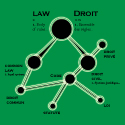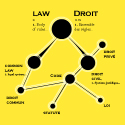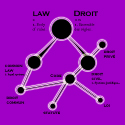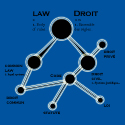

The 2010-2012 series of civil law workshops presented by the Paul-André Crépeau Centre for Private and Comparative Law (formerly the Quebec Research Centre of Private & Comparative Law) explore law’s intraduisibles (elements or aspects which lie beyond translation).
This year, the workshops are presented with financial assistance from Justice Canada’s Support Fund for Access to Justice in Both Official Languages.
The workshops are recognized as part of the mandatory continuing legal education requirements of the Barreau du Québec.
Past Workshops
Christine Morin: "Le testament: une traduction de?"
April 13, 2012, 12:30-2:00, room 202, New Chancellor Day Hall

The eleventh workshop in the 2010/2012 series “Les intraduisibles en droit civil” will be given by Christine Morin.
Abstract: What does a testator seek to express when arranging for the devolution of his property in a will? His sentiments? his duties? his solidarity? his affections? What does the legislature seek to express by leaving the testator free to bequeath his property to whomever he chooses, or, on the contrary, when limiting this freedom? A legal tradition? moral values? social solidarity? Is the depiction of society that emerges from the Civil Code of Québec’s treatment of wills the same as that emerging from the legislation of the other provinces?
Ruth Sefton-Green: "Why Remedies is not a Legal Subject in Civil(ian) Law"
March 23, 2012, 12:30-2:00, room 202, New Chancellor Day Hall

The tenth workshop in the 2010/2012 series “Les intraduisibles en droit civil” will be given by Ruth Sefton-Green.
Abstract: The aim of the presentation is to focus on the absence of remedies and the pre-eminence of rights in civil law. More precisely, we need to explore whether it is the concept of remedies that is lacking in civilian law (with a focus on French law), or just the language of remedies. Dr Sefton-Green’s working hypothesis is that the concept is missing; civil law does not think in terms of remedies; there is no legal categorization of remedies. If this is so, the gap is conceptually embedded and is not just a question of language.
Furthermore, if remedies are absent, what does this tell us about the nature of rights (droits subjectifs) in civil law? Can inferences be drawn about the relationship between rights and obligations? If remedies are absent, does this mean that wrongs are absent as well? Or is there a way to square the circle?
Finally, the quest for remedies in civil law is inevitably linked to an enquiry into the dual relationship between the parties (and their respective rights) in private law and the triangular relationship between the parties and the judge. The pre-eminence of rights and the absence of remedies in civil law, paralleled by the presence of remedies in the common law, will impact on these two relationships.
Jimena Andino Dorato: "L'Autre faute"
March 2, 2012, 12:30-2:00, room 202, New Chancellor Day Hall

The ninth workshop in the 2010/2012 series “Les intraduisibles en droit civil” will be given by Jimena Andino Dorato.
Abstract: Assuming that translation is possible -- but without denying the inherent difficulties of that process -- this presentation examines the notion of fault in Quebec law, beginning with questions raised by its translation. The point of departure of this exercise brings us to the difficulties faced by translators and editors working on the Spanish version of the trilingual Civil Code of Québec. The goal is to examine how these difficulties in translation may aid a renewed understanding of fault in Quebec law. For that, it will be necessary to return to French law, an important source for the laws of Quebec and Latin America, focusing, in particular, on the various interpretations it has received. From this examination of the Other, we will move to an intra-civilian analysis of the “text of departure”, the “text of arrival”, and the family of civil law. This will help establish a third perspective that will remove us from the usual English - French, common law - civil law binary approach, allowing an examination of familiar and foreign laws in a manner that will reveal neither to be wholly familiar or foreign.
Eric H. Reiter: "Translating the Untranslatable: Historical Aspects of the Protection of Honour, Bodily Integrity, and Other Extrapatrimonial Interests in Quebec Civil Law"
January 20, 2012, 12:30-2:00, room 202, New Chancellor Day Hall

The eighth workshop in the 2010/2012 series “Les intraduisibles en droit civil” will be given by Eric H. Reiter.
Abstract: This workshop is a historical look at the slow development of extrapatrimonial personality rights in Quebec law, from the later 19th century to the Civil Code of Québec. With its stated aim to affirm and protect the dignity of the human person, the later 20th-century recodification of private law brought personality rights into the civil code for the first time. Long before this, however, litigants attempted to use the law and the courts to protect intangible and abstract human qualities like honour, bodily integrity, and familial affection. Their attempts – creative and often sophisticated, if not always successful – illustrate some of the obstacles to and conceptual changes behind the development of extrapatrimonial rights in Quebec civil law.
Kirsten Anker: "Aboriginal Rights in Quebec: Always Sui Generis?"
November 23, 2011, 12:30-2:00, room 202, New Chancellor Day Hall

The seventh workshop in the 2010/2012 series “Les intraduisibles en droit civil” will be given by Kirsten Anker.
Abstract: “Aboriginal Title” makes up part of the law of Quebec, but it always comes in borrowed clothes. Existing in pockets of federal law, Aboriginal title sends us to the language of the common law, or to the sui generis concept that is the reconciliation of common law and aboriginal perspectives. Historic accommodations of Aboriginal tenure in Quebec employ a now-defunct set of concepts. Ethnographically, traditional tenure can not be translated from indigenous laws to the terms of civil law without losing much. Discussing the New Relationship Agreement 2008 (Paix des Braves) that now uses traditional Cree “traplines” as a unit of forestry management in Quebec, this presentation will consider the risks and benefits of the sui generis interest in land.
Dr Anne Sanders: "Prenuptial Agreements, Comparative Law and the Notion of Contract"
September 14, 2011, 12:30-2:00, room 202, New Chancellor Day Hall

The sixth workshop in the 2010/2012 series “Les intraduisibles en droit civil” will be given by Dr Anne Sanders.
Abstract: The recent UK Supreme Court decision of Radmacher v Granatino [2010] UKSC 42 has brought prenuptial agreements into the focus of not only English family law, but comparative law too.
Although the majority of the justices considered irrelevant the question whether prenuptial agreements should be understood as contracts, the argument made here is that the different notions of contract in English and German law may help to explain why such agreements have not been enforced for so long in England and what comparative contract law can learn from the notion of prenuptial agreements in the different legal systems.
Jean-Guy Belley: "Contrat et confiance. Traduire le fait relationnel en droit civil"
March 11, 2011, 12:30-2:00, room 202, New Chancellor Day Hall

The fifth workshop in the 2010/2011 series “Les intraduisibles en droit civil” will was given by professor Jean-Guy Belley.
Abstract (only available in French): Quelle est la traduction/qualification juridique adéquate de la relation d’affaires entre un franchiseur et ses franchisés : contrat innomé imposant une obligation de loyauté? relation fiduciaire découlant de la vulnérabilité du partenaire ? relation de confiance ? relation d’interdépendance asymétrique? D’oû vient la difficulté de traduire/qualifier la relation de franchise en droit, plus particulièrement en droit civil : des mots disponibles et autorisés? des particularités de cette forme d’organisation économique? du paradigme classique , libéral, du droit privé? À quel genre dont la franchise serait une espèce peut-on se référer pour définir juridiquement cette relation?
Alexandra Popovici: "Translation as foundation: trusts in Quebec civil law"
February 11, 2011, 12:30-2:00, room 202, New Chancellor Day Hall

The fourth workshop in the 2010/2011 series “Les intraduisibles en droit civil” was given by Alexandra Popovici, graduate student at Université Laval and researcher at the Paul-André Crépeau Centre for Private and Comparative Law (formerly the Quebec Research Centre of Private & Comparative Law). Using the story of the Quebec trust as an illustration of a translation of an intraduisible, this workshop was an occasion to reflect on the fundamental nature of translation in the creation of legal thought.
Professor François Ost: "Intraduisible? Qu'entendez-vous par là?"
January 24, 2011, 12:30-2:00, room 202, New Chancellor Day Hall

The third workshop in the 2010/2011 series “Les intraduisibles en droit civil” was given by Professor François Ost, vice-chancellor at the Facultés universitaires Saint-Louis, Belgium. As a philosopher of language, François Ost reflected on what it means for something to be “untranslatable”. He argued for the necessarily imperfect character of translation (as is the case with respect to language itself), dismissing in this way two simplifying theses: that of “omnitranslatability” and that of the impossibility of translation. As a philosopher of law, he then explored comparative law’s particular function as a type of translation.
Professor Giorgio Resta: "The Commodification of Personality Rights: A Comparative Perspective"
November 24, 2010, 12:30-2:00, room 202, New Chancellor Day Hall

This second workshop was given by Professor Giorgio Resta, Associate Professor of Comparative Law at the University of Bari, Italy (since 2002) and Visiting Professor (2010/2011) at the Faculty of Law, McGill University.
This workshop explored the legal issues surrounding an increasingly important problem: the commodification of personal identity. What are the historical roots of the category of “personality rights” that appear, for example, in Title 2, Book One of the Civil Code of Québec? Does the English word “personality” represent a perfect equivalent of the French personnalité, of the German Persönlichkeit, or of the Portuguese personalidade? And what is the relationship with the competing notion of “privacy”, not only in terms of conceptual taxonomies, but also with regard to the operational rules? The most recent scholarship in this area has suggested that there is a “transatlantic clash” between two western cultures of privacy, one rooted in the idea of liberty and the other in the idea of dignity. Has this difference in approach led to two (or more) different models of regulation?
Professor Richard Hyland: "Is the Gift a Contract?"
October 8, 2010, 12:30-2:00, room 202, New Chancellor Day Hall

This first workshop of the academic year was given by Professor Richard Hyland, Distinguished Professor at Rutgers Law School. Among many other publications, Professor Hyland is the author of Gifts: A Study in Comparative Law (Oxford: OUP, 2009) a book that has attracted a great deal of scholarly attention.
A chapter of Gifts: A Study in Comparative Law can be consulted via Oxford Scholarship Online (subscription required).
